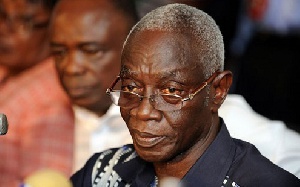The returning officer for the 2012 presidential election, Dr Kwadwo Afari-Gyan, has admitted that some officials contracted by the Electoral Commission (EC) on the day of election committed some errors in the discharge of their duties.
Dr Afari-Gyan saw the mistakes as not unexpected, according to him; they were committed due to the enormous pressure these officials go through on the day of election.
Dr Afari-Gyan who is the chairman of the EC said these at the day 24 of the ongoing election petition hearing at the Supreme Court on Thursday.
The respondents have pleaded that what the petitioners have described as irregularities are at best "clerical errors". The petitioners have rejected this description.
For instance, the issue of pink sheets without signatures of presiding officers and “omissions” in the filling of the pink sheets are in contention and the petitioners want votes from these polling stations where those pink sheets come from annulled.
But in defence of the “errors”, Dr Afari-Gyan told the court only a miracle would cause the officials not to commit errors.
He said getting the right calibre of persons is not easy, particularly in the remote parts of the country. It is also impossible to discern whatever political leanings they may have.
“It would be a miracle if some of them (electoral officers) did not commit mistakes,” he stressed, “so mistakes would not be unexpected”.
He explained that since the officials are not permanent staff of the EC they are hired during election and, therefore, the Commission does not have enough time for their training.
Usually, a presiding officer works for a period of four months, he said, adding that other officials are only hired for about four days.
“As soon as the period ends they are no longer officials of the EC,” he maintained. He also pointed out, “We don’t have permanent returning officers as exist in other countries.”
Later, he gave examples of errors that are bound to occur during election, which he said is termed "transposition error" in electoral language. They can occur in two forms at the collation centre.
General News of Thursday, 30 May 2013
Source: Joy Online

















